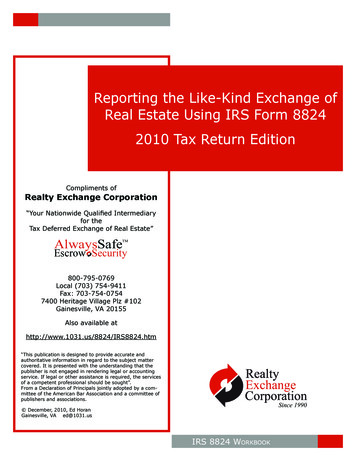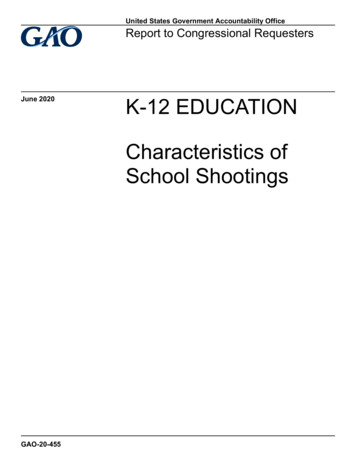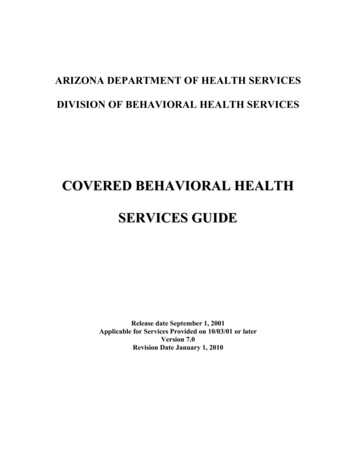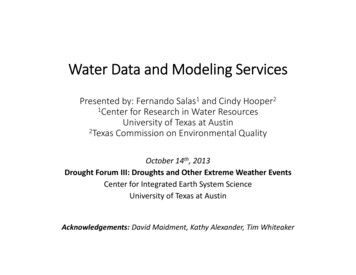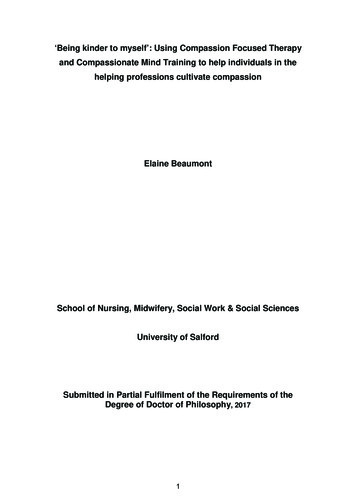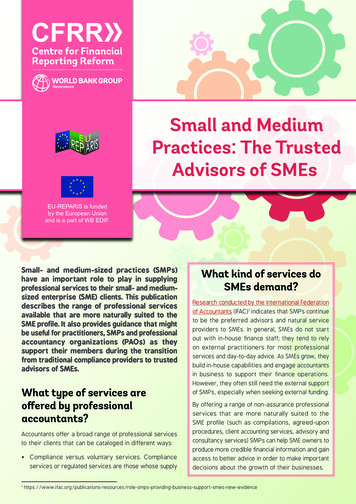
Transcription
Small- and medium-sized practices (SMPs)have an important role to play in supplyingprofessional services to their small- and mediumsized enterprise (SME) clients. This publicationdescribes the range of professional servicesavailable that are more naturally suited to theSME profile. It also provides guidance that mightbe useful for practitioners, SMPs and professionalaccountancy organizations (PAOs) as theysupport their members during the transitionfrom traditional compliance providers to trustedadvisors of SMEs.What type of services areoffered by professionalaccountants?Accountants offer a broad range of professional servicesto their clients that can be cataloged in different ways: Compliance versus voluntary services. Complianceservices or regulated services are those whose supply1What kind of services doSMEs demand?Research conducted by the International Federationof Accountants (IFAC)1 indicates that SMPs continueto be the preferred advisors and natural serviceproviders to SMEs. In general, SMEs do not startout with in-house finance staff; they tend to relyon external practitioners for most professionalservices and day-to-day advice. As SMEs grow, theybuild in-house capabilities and engage accountantsin business to support their finance operations.However, they often still need the external supportof SMPs, especially when seeking external funding.By offering a range of non-assurance professionalservices that are more naturally suited to theSME profile (such as compilations, agreed-uponprocedures, client accounting services, advisory andconsultancy services) SMPs can help SME owners toproduce more credible financial information and gainaccess to better advice in order to make importantdecisions about the growth of their -evidence
is a mandatory requirement per laws, regulations, or contractual obligations (for example audits or financialreporting). Services provided to clients on a voluntary basis are not driven by a requirement to comply. Assurance versus non-assurance services. Assurance services provide either reasonable or limited assurance(e.g. audits, reviews and other assurance engagements) compared with those that provide no assurance (e.g.compilations and agreed-upon procedures). Services and engagements covered by International Standards versus those not covered by International Standards.The standards issued by the International Auditing and Assurance Standards Board (IAASB) cover servicesperformed under the following: International Standards on Auditing (ISAs); International Standards on ReviewEngagements (ISREs); International Standards on Assurance Engagements (ISAEs); and International Standardson Related Services (ISRSs). All other engagements are not covered by IAASB International Standards. However,accountants need to comply with the International Ethics Standards Board of Accountants (IESBA) Code of Ethicswhile performing these engagements. Traditional versus emerging services. Traditional services comprise a range of service offerings that mostaccountancy firms have offered historically, e.g. bookkeeping, accounting, audit and taxation services. Emergingservices include a wide range of service offerings that are driven by technology advancements and client demandfor business advisory or consultancy services. Emerging services can also include newer forms of reporting thatfocus on creating value for clients and their stakeholders, such as enhanced corporate reporting services (e.g.sustainability, social responsibility and integrated reporting services).What services offer potential for SMP growth?Since 2011, the IFAC Global SMP Survey2 has helped to raise awareness about the challenges and opportunitiesfaced by SMPs and SMEs globally. The survey has also provided valuable insights into which services to offer aswell as how to best offer these services.Most SMP revenue is still generated from traditional sources, including compliance, audit and taxation, howeverthe survey results have identified an increase and diversification of SMP services from non-traditional sources.For example, advisory and consulting as well as accounting, compilation and non-assurance/related services haveconsistently been identified as the first and second fastest growing source of SMP revenue globally.2017 Expectedsources of feeincreasesGlobalEuropeChanges in feerevenue 2015vs 201642%44%45%31%37%38%Tax(e.g. Complianceand Planning)38%25%Accounting, CompilationsAdvisory &Audit & Assuranceand Other Non-assurance/Consulting ServicesRelated Services24%32%32%33%35%35%23%30%Source: 2016 IFAC Global SMP /2016-ifac-global-smp-survey-report-summary
How are SMPs transforming their practices?Many SMPs are revisiting their practice models to adjust to technological advancements, evolving needs of theirclients and the changing business environment in order to benefit from the potential offered by providing a rangeof professional services. These transformational changes include: Specializing in non-audit services and moving away from traditional service focused practices; Investing in new technologies (cloud computing, data analytics); Talent management and developing both technical and soft skills (selling, negotiating, branding); Rethinking their pricing models by moving towards value pricing over time-based billing; Increasing their promotional efforts and placing greater focus on branding and marketing, including developinga digital marketing strategy; and Developing networks and partnerships to extend their knowledge, share resources and enter referral arrangements.By building on their original role which focused on compliance, SMPs that make these changes are successfullytransforming their practices into becoming trusted business advisors of their SME clients.Professional Service Firms versus Traditional Accounting FirmsOutsourcing, technological advancements, competition, SMEs’ shifting demands, the economic environment aswell as regulatory changes are all having a rapid and significant impact on the accounting industry. All of theseenvironmental change factors have increased the need for accountants to think more strategically about theway they operate. More recently, smaller accounting practices have started to brand and market themselvesas professional service firms that provide quality advice and expertise outside the traditional accounting scope,which has the most impact for small businesses.In order to expand their skill set, professional service firms hire non-accountants, e.g. professionals with doubledegrees (commerce, law, and/or marketing) or with a specific field of specialization (e.g. IT, cyber security). Insome cases they use a referral system in order to overcome the limited in-house capabilities across a varietyof business operations. Others join networks to expand their range of expertise as well as their functional andgeographical diversification.Traditional accounting firms have taken a passive stance towards marketing activities because they were perceivedas incompatible with the profession. Professional service firms are emerging as active marketers with establishedbranding, marketing and digital strategies. Their approach includes a well-developed communications strategy(client newsletters, websites, face-to-face communication) to attract new clients and cross sell to existing onessupported by in-house or outsourced marketing specialists.Professional service firms have a very different approach to pricing their services compared to traditionalaccounting firms, who usually base the fees they charge purely on a system of hourly or other time-basedbillings. New concepts are emerging, such as value pricing and total pricing concepts that allow clients to enjoya better customer experience while also maximizing the opportunities for professional service firms to crosssell additional services and ensure that the interests of the practitioners are better aligned with those of theirclients. Some examples of the new value based pricing concepts include: Basing prices on a percentage (10-20 percent) of savings achieved; Agreeing on a fixed or total price upfront to avoid any potential surprises to the client and so that customerscan compare value to price before they agree to purchase the service; Offering several levels of service packages and different pricing options for each package; and Providing a service guarantee whereby clients are eligible for total or partial reimbursement of the fees paidif they are not completely satisfied with the service.
AUDITSREVIEWSInternational Standards on ReviewEngagements (ISREs)OTHER ASSURANCEENGAGEMENTSNON-ASSURANCE ENGAGEMENTSInternational Standards on AssuranceEngagements (ISAEs)RELATED SERVICES:AGREED-UPON PROCEDURES& COMPILATIONSISQC 1: International Standard on Quality ControlASSURANCE ENGAGEMENTSInternational Standards on Auditing (ISAs)International Standards on Related Services(ISRSs)ALL OTHERENGAGEMENTSNot covered by standardsIESBA CODE OF ETHICS FOR PROFESSIONAL ACCOUNTANTS
Range of Professional ServicesUnderstanding the range, requirements and benefits of available professional services is essential for practitionersand SMPs to be able to tailor the various services to meet the needs of their SME clients, as well as helping themto choose the right service for their needs.AUDITS provide a reasonable (high but not absolute) assurance after performing procedures to obtain sufficientand appropriate evidence that enables the auditor to issue an opinion on a company’s financial statements as towhether they are prepared, in all material respects, in accordance with an applicable financial reporting framework.REVIEWS include performance of procedures, mainly consisting of inquiry and analytical procedures. This enablesthe professional accountant to obtain limited assurance and conclude on whether they have become aware of anymatter that may cause the financial statements to be materially misstated.OTHER ASSURANCE ENGAGEMENTS include a broad category of engagements that express assurance on engagementsother than audits or reviews of historical financial information. These include specific standards on the examinationof prospective information and assurance reports on controls at a service organization, greenhouse gas statementsand reports on the compilation of pro forma financial information included in a prospectus.AGREED-UPON PROCEDURES are engagements that do not provide any assurance regarding financial information.The professional accountant performs specified procedures which are agreed with the client at the outset of theengagement and are reported in a report on factual findings regarding the financial information.COMPILATIONS are also engagements that do not provide any assurance. Under these engagements, the professionalaccountant assists management with the preparation and presentation of financial information in accordance withan applicable financial reporting framework.OTHER NON-ASSURANCE ENGAGEMENTS that are not covered by IAASB International Standards include a wideranging category of professional services. These services range from compliance oriented and traditional accountancyservices (e.g. simple bookkeeping to more complex financial analysis and accounting framework conversions) andtax compliance services (e.g. preparing returns for tax purposes and other tax compliance engagements), to morerecently developed accounting firm service models enabled by technological advances, advisory and consultancyservices.CLIENT ACCOUNTING SERVICES are offered by organizations that provide automated technology and affordableaccounting guidance, thanks to cloud-based software and technology. These services enable SMEs to obtainbookkeeping, accounting and controller services virtually, from remote teams of accounting experts.THE VIRTUAL CFO is a new concept enabled by technological advances and is an effective way for small businessesto get access to an experienced financial professionals at a fraction of the cost of a full-time CFO. The virtual CFOhandles all of the traditional CFO’s duties but works remotely and on a part-time basis. In addition to back-officefunctions, duties include monitoring the financial health of the business (usually with cloud technology) and offeringfinancial insights and guidance on all company decisions.ADVISORY AND CONSULTANCY SERVICES are especially attractive to high growth SME owners as they enable themto use financial information and advice to make better informed decisions on how to utilize resources effectively.The type of SMEs that are more inclined to seek external business advisory and consultancy services include thefollowing: those with higher growth rates or expectations to grow; SMEs with higher levels of debt or those seekingfunding; and larger and younger SMEs. Similarly, larger and more proactive SMPs are more inclined to implement astrategy to offer business advisory and consultancy services.
The demand for business advice versus the profession’sindependence requirementsThe emergence of advisory and consultancy services has been driven by the growing demand from SME ownersfor specialist advice to help them achieve a competitive advantage in a complex marketplace. Much of this adviceoriginates from traditional forms of services and is requested from SMPs’ audit clients. This is not surprising asauditors are professionals trained to provide services from an external perspective with an independent viewpoint.An additional factor is that SME owners already have a relationship with their auditors which is built on trust.There are, however, potential threats that need to be considered by SMP audit firms that also provide businessadvisory services to audit clients. For example, there is the possibility of creating a “familiarity” threat, wherebythe auditor becomes too close to the company that they are also auditing. Another factor that needs to beconsidered concerns over-reliance on income from a single source when a financial dependency threat is created.Any potential threat needs to be carefully considered by the SMP audit firm and appropriate safeguards shouldbe put in place to ensure that the requirements of the IESBA Code of Ethics for professional accountants arecomplied with.One current IESBA project is on safeguards and their applicability pertaining to non-assurance services that mayhave particular implications for SMPs. The projects objective is to review existing safeguards across the code,review if changes are necessary and assess whether additional safeguards should apply in certain circumstances.Advisory and consultancy services include a wide area of offerings, including:Business Development Strategic business planningCorporate AdvisoryWealth Creation andPreservation Strategic business planning Budgets and projections Advice on financing and accessto finance SWOT analysis Cash flow Investment strategy Marketing Due diligence Asset allocation Benchmarking Valuations Estate and succession planning Financial position evaluation Forensic accounting Litigation supportManagementAccounting Planning and budgetingHuman ResourcesOther Advisory andConsultancy Areas Tax planning and advisory Management reporting Business coaching andmentoring Internal control Pensions Cybersecurity Product and customer planning Remuneration schemes andpayroll Enhanced corporate reporting(sustainability, socialresponsibility and integratedreporting) Performance Risk management Design of incentive schemes Training and skill development IT system support
Most frequently provided business advisory and consulting services in 2016Corporate Advisory48%Management Accounting46%Human Resources / Employment Regulations30%Business Development29%Restructuring / Insolvency / Liquidation24%23%Succession Planning / Business Transfers18%Forensic Accounting / Fraud InvestigationInformation Technology15%Business Intelligence15%14%Enhanced Corporate Reporting12%Wealth Management / Retirement PlanningHealth & Safety / Environmental Legislation4%Source: 2016 IFAC Global SMP SurveyIAASB activities in respect of other professional servicesThe role of other professional services has become more widely appreciated in recent years. Internationalstandard-setters have issued a number of standards specifying requirements and providing application guidance.In line with its strategic goal of ensuring that standards evolve in order to address the emerging needs ofstakeholders for services other than audits, the IAASB has issued several new discussion papers related toservices other than audits: In August 2016, the IAASB Integrated Reporting Working Group issued a discussion paper for public comment:Supporting Credibility and Trust in Emerging Forms of External Reporting: Ten Key Challenges for AssuranceEngagements3. The discussion paper is a response to the increasing demand for action to support credibilityand trust in emerging forms of external reporting. It also explores how the IAASB’s current standards,especially ISAE 3000 (Revised), Assurance Engagements Other than Audits and Reviews of Historical FinancialInformation, may be applied. In November 2016, the IAASB Agreed-Upon Procedures Working Group issued the discussion paper: Exploringthe Demand for Agreed-Upon Procedures Engagements and Other Services, and the Implications for the IAASB’sInternational Standards4. This discussion paper sought input from practitioners in view of the planned projectto revise ISRS 4400, Engagements to Perform Agreed-Upon Procedures Regarding Financial Information. Inparticular, practitioners were requested to provide input on the extent to which the existing requirementsare helpful or challenging. This input will help the IAASB to understand how reports on factual findings areused to determine the needs of users, and to explore the demand for engagements that combine reasonableassurance, limited assurance, and non-assurance g-demand-agreed-upon-procedures-engagements-and
5Ways PAOs can enhancethe SMP-SME relationshipThere are a number of activities that PAOs can undertake to enhance the SMP-SME relationship and support SMPpractitioners as they make the transformational changes needed to become trusted advisors to SMEs:#1Focus on SMP-SME issues Create and set up SMP-SME advisory groups andformalized working committees that represent theinterests of SMPs and promote their visibility andrecognition. Conduct surveys to understand the SMP landscape,their needs and the skills required to help theprofession prepare the future generation ofpractitioners. Commission research to understand theopportunities and challenges faced by both SMPsand SMEs as a tool to provide valuable insights intowhat services to offer as well as how to best offerthese services. Provide regular input (globally, regionally andnationally) to policy development, standard setting,legal and regulatory reform processes that impactthe SME segment. Sponsor satisfaction surveys in order to monitorhow SME needs are met and learn valuable lessonsabout how their needs can be served better.#2Facilitate contacts between SMPs and SMEs Maintain (online) public registers that enable anaccountant to be located by region, specialization,size of firm or other relevant criteria that facilitatebusiness and service-matching, i.e. “Find anAccountant” databases. Provide contact details and other information aboutSMPs and practitioners to interested clients andSMEs. Initiate and maintain registers of firms interested injoining networks in order to enhance and broadenthe quality of services rendered, enable a referralsystem and assist in the pooling of resourcesbetween practitioners and SMPs.
#3Raise awareness about the benefits of the SMPSME connection Promote the role of accountants and build trust in theprofession through publications, articles and media. Raise awareness and help establish widerrecognition that professional accountants aresubject to professional ethics requirements, as afundamental differentiation from other businesssupport consultants. Engage in alliances, partnerships and joint initiativesbetween PAOs and small business supportorganizations and/or chambers of commerceaimed at improving the interaction and perceptionof professional accountants among SMEs and topromote their role as trusted SME business advisors. Raise awareness about of the available servicesthat can help SMEs solve their business challenges. Facilitate specialized groups within small businesssupport organizations, chambers of commerce andother institutions through participation, sponsoringor chairing their specialist working meetings andsessions (e.g. tax consultancy groups, foreigninvestor councils, etc.). Support events and exhibitions that enableaccountancy service providers to showcase therange of professional services available and thebenefits they offer to SMEs. Represent the profession by undertaking anactive role in speaking engagements at job fairs,commercial chambers events, universities andgovernmental receptions. Organize competitions to award innovative andsuccessful professional service firms. Host conferences, forums and other outreach eventson topics of interest to SMEs in order to promotethe benefits of the SMP-SME interaction.#4Provide education and skills training to SMPsand SMEs Develop education programs to promote specificcompetences (e.g. skills in business judgment,technology and data analytics, soft skills etc.). Organize specialized technical groups to providetraining to fellow SMPs (e.g. on cybersecurity orenhanced corporate reporting). Offer focused personal trainers, mentoring andcoaching courses. These courses would educatemembers on professional service offerings thatare available as well as enhancing their soft skills.In addition, the courses would equip them with theskills necessary to “coach” their SME clients on howto select the right service for their needs and helpthem connect to the appropriate service providersor networks of service providers. Encourage SMPs staff to engage as lecturersat continuing education sessions or in academicprograms on a part-time basis to develop orenhance their communication and presentation skills. Provide free of charge classes to educate SMEsand other stakeholders (e.g. bankers) on availableservice offerings, selecting a professional servicefirm, and other related areas.
#5Develop resources, guidance and tools forSMPs and SMEs Develop guidance and toolkits for SMPs to enablethem to offer business advice to SMEs, makechanges in their practice models and deliver newservices. Provide PowerPoint presentations and brochuresto help SMPs approach small clients and markettheir services. Promote the use of technology and connectaccountancy technology providers with SMPs.IFAC’s SMP FocusThe International Federation of Accountants (IFAC), with the support of the Small and Medium Sized PracticesCommittee that acts as its strategic advisor, supports the SMP sector through a number of initiatives. Theseinitiatives are designed to raise the profile and build the capacity of SMPs globally, as well as increase awarenessabout their role and value, especially in supporting SMEs.Key IFAC SMP guidance and publications include the following resources that can be accessed at www.ifac.org/smp: Guide to Compilation Engagements5 Guide to Review Engagements6 Guide to Quality Control for Small- and Medium-Sized Practices (QC Guide)7 Guide to Using International Standards on Auditing in the Audit of Small- and Medium-Sized Entities (ISA Guide)8 Guide to Practice Management for Small- and Medium-Sized Practices (PM Guide)9 Good Practice Checklist for Small Business10 Choosing the Right Service: Comparing Audit, Review, Compilation, and Agreed-Upon Procedure Services11 Value Pricing Series Pricing on Purpose: How to Implement Value Pricing in Your ricing-your-firm-parts-i-iii56
Further useful SMP resources can be found at IFAC Global KnowledgeGateway (www.ifac.org/gateway), including the following articles: Attracting and Retaining New Talent: The Case for SMPs13 The Future of Small Practices & Service Offerings14 Is Your Accounting Firm Ready?15 Tomorrow’s Firm—Think Big, Think Advisory16 Where Machines Could Replace Accountants - and Where TheyCan’t (Yet)17RecognitionThe World Bank Centre for Financial Reporting Reform (CFRR) wishes to thank participating trainers and ProfessionalAccountancy Organizations of the EU REPARIS Audit Training of Trainers Community of Practice (Audit ToT) (listedbelow in order of country): Institute of Authorized Charted Auditors of Albania (IEKA) The Association of Accountants and Auditors of Republika Srpska (AAARS) Union of Accountants, Auditors and Financial Workers of Federation of Bosnia and Herzegovina (SRRF-FBH) Auditors Chamber in the Federation of Bosnia and Herzegovina Institute of Certified Public Accountants of Bulgaria Croatian Audit Chamber Estonian Auditors’ Association The Society of Certified Accountants and Auditors of Kosovo (SCAAK) Institute of Certified Auditors of the Republic of Macedonia (ICARM) Institute of Certified Accountants of Montenegro (ICAM) Philippines Board of Accountancy Chamber of Financial Auditors of Romania (CAFR) Chamber of Authorized Auditors of Serbia (CAA) Serbian Association of Accountants and Auditors where-machines-could-replace1314
AcknowledgementsThis publication is the product of a process of exchange of ideas and information among members of the Audit Training ofTrainers (Audit ToT) Community of Practice, under the EU-REPARIS Program. It was developed by Kalina Shukarova–Savovska,Senior Financial Management Specialist, CFRR, the World Bank, with contributions and inputs from Christopher Arnold, Headof SME/SMP and Research, International Federation of Accountants; Johnny Yong, Technical Manager, Global AccountancyProfession Support, International Federation of Accountants; Mats Olsson, Deputy Chair, IFAC Small and Medium PracticesCommittee and Paul Thompson, Director, European Federation of Accountants and Auditors for SMEs (EFAA – www.efaa.com).The team wishes to thank Bonnie Ann Sirois and John Hodge, both Senior Financial Management Specialists, CFRR, The WorldBank and Piotr Pyziak, Consultant, CFRR, The World Bank, for their comments on this publication. 2017 International Bank for Reconstruction and Development / The World Bank, 1818 H Street NW, Washington DC 20433, Telephone: 202473-1000, Internet: www.worldbank.orgThis work is a product of the staff of The World Bank with external contributions. The findings, interpretations, and conclusions expressed in thiswork do not necessarily reflect the views of The World Bank, its Board of Executive Directors, or the governments they represent.The World Bank does not guarantee the accuracy of the data included in this work. The boundaries, colors, denominations, and other informationshown on any map in this work do not imply any judgment on the part of The World Bank concerning the legal status of any territory or theendorsement or acceptance of such boundaries.Rights and Permissions:The material in this work is subject to copyright. Because The World Bank encourages dissemination of its knowledge,this work may be reproduced, in whole or in part, for noncommercial purposes as long as full attribution to this work is given.Any queries on rights and licenses, including subsidiary rights, should be addressed to World Bank Publications, The World Bank Group, 1818 HStreet NW, Washington, DC 20433, USA; fax: 202-522-2625; e-mail: pubrights@worldbank.org.
transforming their practices into becoming trusted business advisors of their SME clients. . those with higher growth rates or expectations to grow; SMEs with higher levels of debt or those seeking funding; and larger and younger SMEs. . strategy to offer business advisory and consultancy services. Wealth Creation and Preservation .



